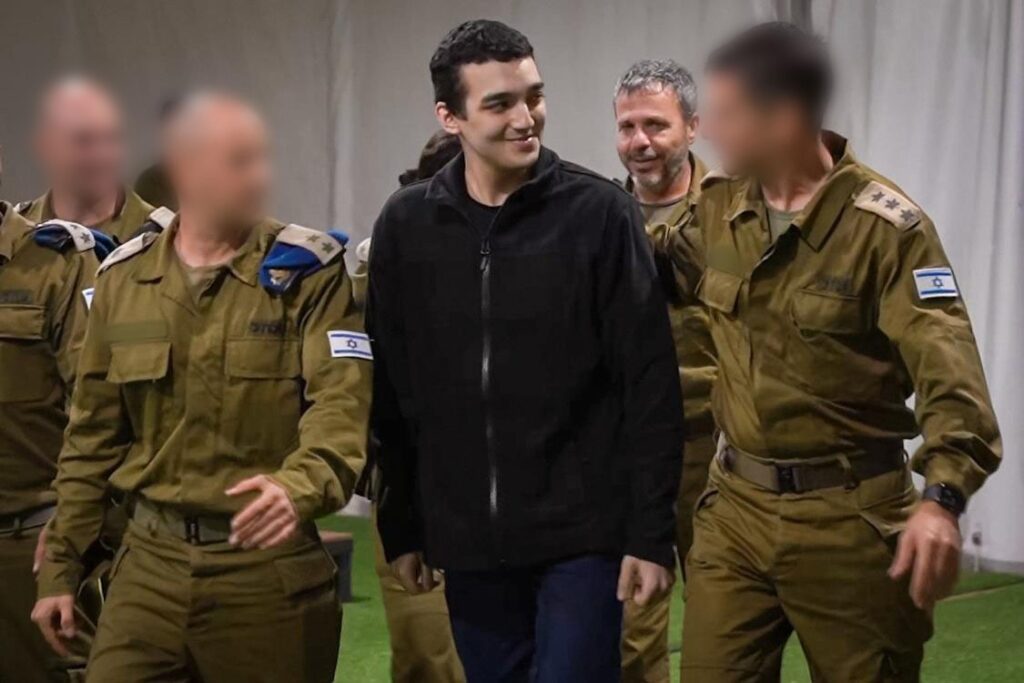
Overview
- The Hamas delegation in Doha has announced its intention to resume negotiations on a hostage deal with no preconditions.
- On Sunday, May 18, Israel launched Operation “Gideon’s Chariots” amid stalled hostage negotiation talks based on the Witkoff outline, coinciding with President Trump’s visit to the Middle East.
- The IDF and Shin Bet destroyed extensive underground infrastructure using bunker-busting munitions aimed at eliminating Muhammad Sinwar, the Hamas Gaza leader.
- Hamas announced the release of Idan Alexander, a 21-year-old American hostage, as a gesture toward Trump.
- A terrorist shooting occurred in the Samaria, severely injuring a pregnant woman who later died; her newborn survived an emergency cesarean.
- The Israeli Air Force conducted Operation “Red Sunsets”. Utilizing 15 fighter jets and 30 munitions, Israel targeted docks at the port of As-Salif and two docks at Al-Hudaydah port.
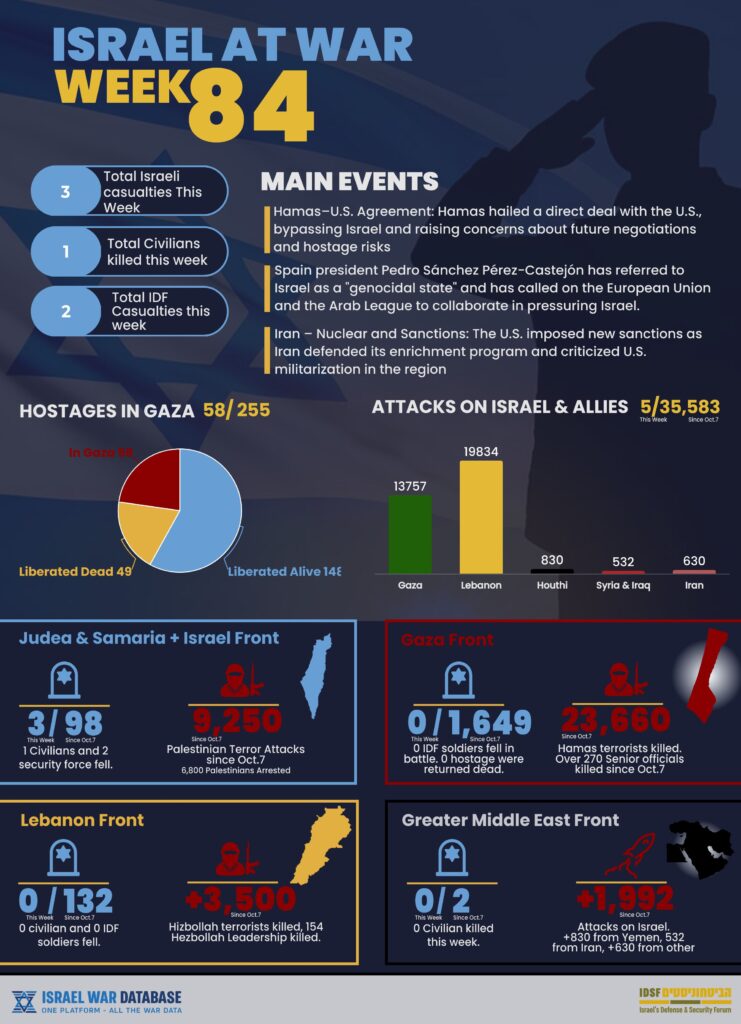
Gaza
Hostage Deal
- Following meetings between Netanyahu, Witkoff, and US Ambassador Mike Huckabee, Netanyahu announced an Israeli delegation would negotiate in Doha, Qatar, but emphasized discussions would only occur “under fire,” indicating continued military action post-Trump’s Gulf visit.
- Israel’s Channel 13 news said Netanyahu subsequently told his coalition partners that Israel would negotiate only regarding the Witkoff framework, as opposed to a wider deal. Prime Minister Benjamin Netanyahu instructed Israel’s negotiating team to remain in Qatar for the time being. According to reports, the deal on the table would see the release of 10 living captives for a ceasefire lasting one-and-a-half-to-two-months and 200-250 Palestinian convicted terrorists would be released from Israeli prison.
- Hamas-affiliated media channels celebrated the recent agreement between the United States and Hamas, describing it as “the first-ever agreement in history between America and Hamas.” They emphasized that “Netanyahu and his government did not bow down—rather, it was America itself that knelt to negotiate with Hamas.” While the return of hostage Idan Alexander has sparked relief, it also presents significant risks. From Hamas’s perspective, this agreement is viewed as a form of “surrender” by a superpower to a terrorist organization, potentially endangering the lives of remaining hostages by setting a precedent. Such a partial deal could also embolden Hamas in future negotiations, as they have successfully engaged directly with the U.S., bypassing Israeli involvement.
- According to recent reports, Palestinian-American political activist Bishara Bahbah was instrumental as a mediator between the Trump administration and Hamas, successfully facilitating the release of American-Israeli hostage Edan Alexander. Bahbah, previously the head of Arab Americans for Trump, was contacted by Hamas official Ghazai Hamad to connect with U.S. special envoy Steve Witkoff.
- Following increased IDF operations in Gaza, the Hamas delegation in Doha has signaled its willingness to resume hostage negotiations without preconditions—a notable shift from their earlier hardline stance. The softening of Hamas’ position which was defiantly intransigent is due to Israel’s mounting military pressure with the renewal of the military campaign and the possible elimination of hard-liner leader, Mohammad Sinwar who opposed any hostage deal.
- According to Israel’s Channel 13 News, Prime Minister Benjamin Netanyahu has instructed Israel’s negotiating team to remain in Qatar but emphasized that negotiations will strictly adhere to the Witkoff framework, rather than a broader deal. Israeli media (Kan news) reported that the current deal on the table involves the release of 10 living hostages in exchange for a ceasefire lasting 1.5 to 2 months, alongside Israel releasing 200-250 convicted Palestinian terrorists from Israeli prisons.
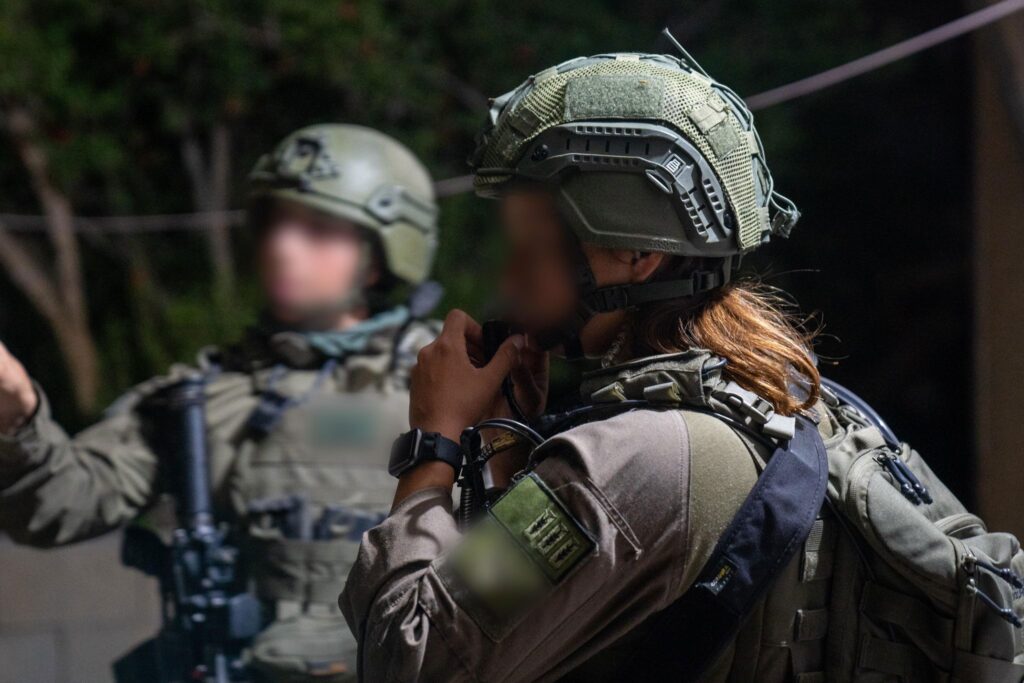
Operational
- On Sunday, May 18, Israel launched Operation “Gideon’s Chariots” amid stalled hostage negotiation talks based on the Witkoff outline, coinciding with President Trump’s visit to the Middle East. The IDF began heavy air bombardments accompanied by a significant ground incursion, deploying heavy engineering equipment.
- On Wednesday afternoon, May 14, the IDF Spokesperson released intelligence-based graphical mappings revealing terror activities within civilian-populated areas in western Gaza City. Terror infrastructures were identified within three schools and the Islamic University, near Shifa Hospital in the Rimal neighborhood. Despite previous operations, the hospital continues to serve as a terror hub, with an extensive underground tunnel network remaining intact near the Gaza Port, possibly sheltering Hamas battalions like the Shati Battalion.
- The IDF has urged civilians to evacuate through air-dropped leaflets and direct communication, resulting in tens of thousands moving southward, including evacuation calls to the residents of the “Abasans”, east of Khan Yunis. The Gaza Brigade Commander Azz ad-Din al-Haddad oversees operations alongside remnants of the Northern Brigade. Securing western Gaza City is critical to decisively defeating Hamas and is believed to hold hostages, given previous hostage releases from this area.
- Southeast of Khan Yunis, near the European Hospital, the IDF and Shin Bet destroyed extensive underground infrastructure using bunker-busting munitions aimed at eliminating Muhammad Sinwar, the Hamas Gaza leader after the killing of his brother Yahya Sinwar. Although his death remains unconfirmed, such a strike would severely disrupt Hamas’s organizational structure. Azz ad-Din al-Haddad, The Gaza Brigade Commander, is expected to replace Sinwar, leaving him alongside Muhammad Shabaneh of the Rafah Brigade as Hamas’s last major leadership figures.
- Increased bombings followed Idan Alexander’s release, triggering mass evacuations from northern Gaza and Khan Yunis. The European Hospital ceased operations, and the IDF seeks to clear northern hospitals serving as Hamas and Islamic Jihad command centers. Additionally, the IDF eliminated Hamas’s former battalion commander turned finance official, responsible for transferring millions of dollars in salaries to terrorists in northern Gaza. From Thursday to Friday, Israeli forces targeted 150 terrorist sites including anti-tank positions, terror cells, and strategic buildings in northern Gaza, particularly around Beit Lahia and al-Tatra neighborhoods, preparing for simultaneous battles reminiscent of past operations in Jabalia and Khan Yunis.
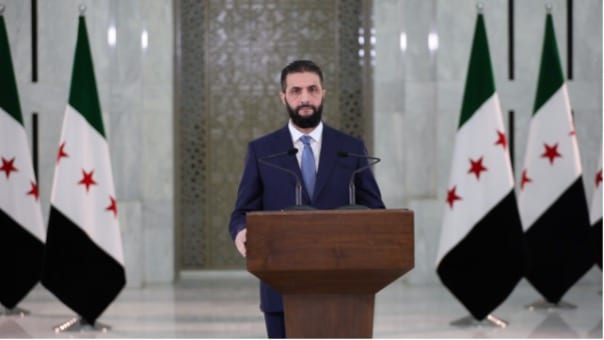
Diplomatic
- Hamas announced the release of Idan Alexander, a 21-year-old American hostage, as a gesture toward Trump. The negotiation, led by Adam Boehler, occurred behind Israel’s back, signifying a strategic setback for Israel despite reducing the hostage count to 58. Hamas indicated a willingness for broader negotiations on ending the war, Israeli withdrawal, prisoner exchanges, and reconstruction plans.
- Witkoff traveled to Oman, meeting Iranian, Egyptian, and Qatari officials to push negotiations forward. Hamas described this release as a step towards resuming war-ending negotiations, opening border crossings, alleviating Gazan suffering, and participating in a post-war technocratic government. Celebratory rallies erupted in Gaza, marking Hamas’s perceived victory.
- A Wall Street Journal exclusive revealed Hamas’s motivation behind the October 7 attack, aiming to derail the Israel-Saudi normalization process. Yahya Sinwar emphasized at an October 2 meeting that a normalization deal posed a severe threat to Palestinian interests, calling for an “extraordinary act” to shift regional dynamics. Internal Hamas documents recommend intensifying conflict in Judea and Samaria and Jerusalem to complicate Saudi-Israeli normalization.
- According to NBC News (May 16), the Trump Administration allegedly discussed relocating one million Gazans to Libya in exchange for lifting sanctions and releasing billions in frozen Libyan assets, an assertion denied by the administration.
- Mohammad Darwish, head of Hamas’s political bureau, met in Doha with Iran’s Kamal Kharazi, former foreign minister and head of the Strategic Council for Foreign Relations. Both Hamas and Iran are taking advantage of the new American openness to direct talks, aiming to strengthen Iran’s proxy network. Tehran continues to rebuild the “Axis of Resistance” concurrently with ongoing nuclear negotiations. Hamas, too, is expected to capitalize on this unprecedented direct diplomatic channel with Washington.
Humanitarian Aid
- On May 14th, the Gaza Humanitarian Fund (GHF) announced it would commence operations in Gaza by the end of May, during which Israel would lift its over two-month blockade. The GHF stated it has secured Israeli approval to establish additional “Safe Distribution Sites” (SDSs) throughout Gaza, aiming to significantly expand humanitarian reach.
- GHF further noted it was in the final stages of obtaining sufficient food supplies from existing aid organizations in Gaza to distribute 300 million meals within the initial 90 days of operations. American security firms UG Solutions and Safe Reach Solutions have agreed to manage logistics and security at these SDSs, thereby reducing the direct involvement of the IDF in these humanitarian efforts.
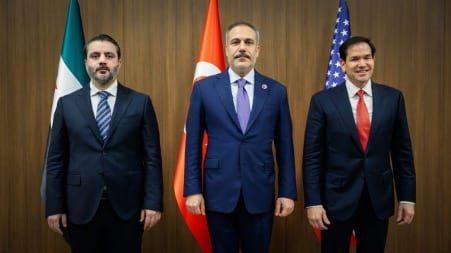
President Trump Trip to the Middle East
- Trump’s visit concluded positively in Qatar, securing major investments including Qatar’s purchase of 160 Boeing aircraft and a total investment commitment of $1.2 trillion over ten years. Trump praised Qatar’s mediation efforts and encouraged resolution of the Gaza conflict.
- Saudi Crown Prince Mohammad bin Salman announced plans to invest $600 billion in the U.S. economy and the UAE pledged $1.4 trillion in investments. Discussions included significant investments in artificial intelligence, semiconductor chips, and data centers.
- In an interview to Fox News, Trump has expressed his gratitude to the leaders of Qatar for being so “nice” by offering a new Air Force One jet to replace the over 40–year–old plane being used by the President.
- Yet, in the same interview Trump identified Iran as the main problem of the middle east.
Judea and Samaria
- A terrorist shooting occurred in the Samaria, severely injuring a pregnant woman, Tze’elah Gez, who later died; her newborn survived an emergency cesarean. Hamas openly praised the attack.
- Kfir Brigade soldiers in Tulkarm dismantled an explosives lab containing 200 explosive devices and 150 kg of raw materials.
Lebanon
- Lebanese Parliament Speaker Nabih Berri condemned any move towards normalization with Israel, stating emphatically: “The enemy seeks, through escalation, to drag Lebanon towards normalization, which is unacceptable. Normalization with Israel is treason and will never happen.”
- According to a Wall Street Journal report, the Lebanese government dismissed dozens of employees from Beirut International Airport due to suspected Hezbollah activities. Since February, the airport has been closed to Iranian airlines, reflecting increased efforts by Lebanon—supported by the U.S.—to combat Iranian-linked smuggling operations.
Syria
Military Activity
- The Institute for the Study of War (ISW) warns al-Julani is facing a potential rebellion from his diverse forces, which includes extremist Sunni factions linked to ISIS and al-Qaeda. Some of the popular chants among the Salafists factions in HTS army include calls to march to Al Aqsa and destroy Israel. Even if al-Julani has actually moderated his positions and it is not merely a façade to convince the West to remove sanctions and reintegrate his country into world’s good graces, he remains beholden to the Salafists factions in his governing coalition which prevents him from reaching some détente with Israel and the West.
- His recent meeting with President Trump and his increasing alignment with Western interests, including potential cooperation with the U.S. against ISIS cells in Syria, could provoke internal backlash and rebellion among his extremist ranks.
Diplomacy
- Trump said in an interview to Fox News that he decided to remove the sanctions from Syria after MBS asked him to give the new Syrian government a chance. Trump seemed to be impressed by Al- Julani and decided to give him a chance.
- Trump promised Syrian President al- Julani sanctions relief, urging him to join the Abraham Accords. Al-Julani conditionally agreed, emphasizing adherence to the 1974 disengagement agreement, implicitly demanding full Israeli withdrawal, including Mount Hermon.
- Israeli and Syrian representatives met in Baku, mediated by Azerbaijan, to ease security tensions.
- Following a meeting between President Trump and Syrian leader Abu Mohammad al-Julani, al-Julani extended an invitation to American companies to invest in Syria’s oil and gas sectors.
- Syrian Foreign Minister Asaad al-Shibani discussed details of lifting U.S. sanctions and improving bilateral ties with U.S. Secretary of State Marco Rubio in Antalya, Turkey, in the presence of Turkish Foreign Minister Hakan Fidan.
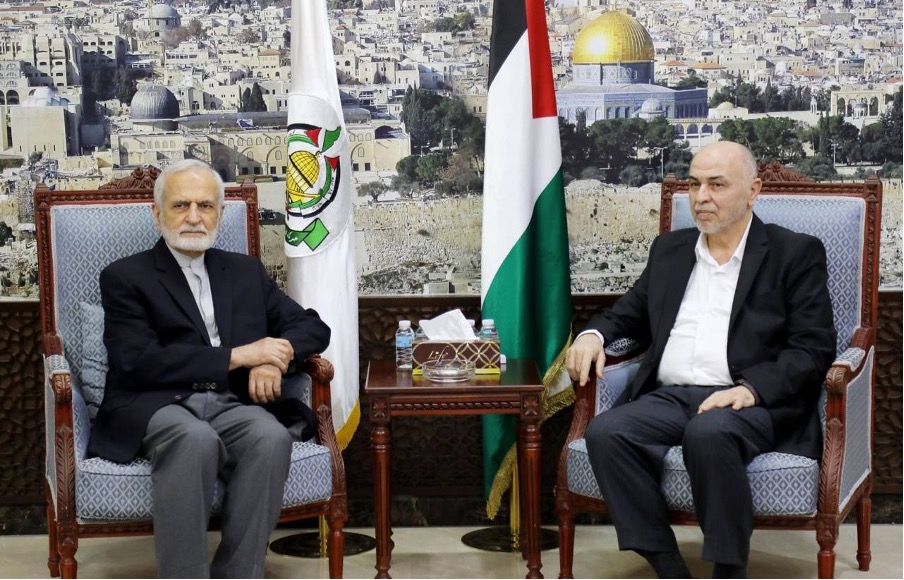
Yemen
- The ISW indicates the Houthis sought a ceasefire under US pressure, partially agreeing to halt maritime attacks but rejecting broader peace terms with Saudi Arabia. The US spent $1 billion on its campaign against the Houthis without decisive results, who have managed to improve their air defenses and targeted Israeli flights during Trump’s Riyadh visit.
- The IDF’s Arabic spokesperson issued warnings to anyone located at any of the three Houthi ports—Al-Hudaydah, Ras Isa, and As-Salif, designating these areas as dangerous due to imminent Israeli attacks.
- On Friday evening, the Israeli Air Force conducted Operation “Red Sunsets”. Utilizing 15 fighter jets and 30 munitions, Israel targeted docks at the port of As-Salif and two docks at Al-Hudaydah port.
- These targeted ports serve as critical hubs for Iranian arms smuggling, handling sophisticated weaponry, including complete cruise and ballistic missiles, components for large drones, long-range rockets, and solid rocket fuel, requiring large ships and port facilities with cranes. Israel’s targeted strikes are specifically designed to prevent these shipments, aiming to surgically degrade the Houthis’ missile-launch capabilities toward Israel.
- Defense Minister Israel Katz warned of possible assassination of Houthi leader Abdul-Malik al-Houthi, aiming to isolate Yemen internationally by shutting key transportation hubs.
Iran
- Iran conducted defensive military exercises, preparing against potential US-Israeli attacks, strengthening defenses particularly around the Persian Gulf and the strategic Strait of Hormuz.
- Senior Iranian and E-3 representatives met in Istanbul, attempting to avoid looming snapback sanctions, coinciding with anticipated US diplomatic engagements involving Putin and Zelensky.
- U.S. Treasury’s Office of Foreign Assets Control (OFAC) announced new sanctions targeting the Iranian company Pouya Pars Technologies, along with Iranian citizens Mohammad Reza Sadeghi Saber, Ahmad Hajighat Talab, and Mohammad Reza Mahdipour.
- Iranian Foreign Minister Abbas Araghchi strongly reaffirmed Iran’s stance, stating explicitly: “We will not dismantle any of our nuclear facilities, and preserving nuclear enrichment is one of our fundamental principles.” Araghchi emphasized that maintaining Iran’s uranium enrichment capabilities domestically remains a critical principle in the negotiations, adding that Iran’s military strength has deterred the United States from considering military force against it.
- Quds Force Commander Esmail Qaani visited Baghdad and met with Iraqi parliamentarians from the Badr Organization. Iraq is hosting an Arab summit on May 17, attended by heads of most Arab states. Through this summit, Iran aims to advance a unified Arab position urging the United States to lift economic sanctions—particularly those affecting Iranian oil exports
International
- France has officially taken legal action against Iran at the International Court of Justice (ICJ). French Foreign Minister Jean-Noël Barrot accused Tehran of unjustly detaining two French citizens on charges of espionage, prompting Paris to lodge a formal complaint against Iran at the ICJ.
- Saudi Foreign Minister Prince Faisal bin Farhan expressed hope for the establishment of a Palestinian state. He noted numerous investment opportunities in Syria, particularly once U.S. sanctions are lifted. Saudi Arabia expects enhanced support for Syria as sanctions are gradually removed.
- An Arab summit in Baghdad has commenced, viewed by Iraq as a significant opportunity to reassert itself regionally. According to Arab sources, the summit’s agenda prioritizes regional dialogue concerning the Syrian situation and the Gaza conflict.

